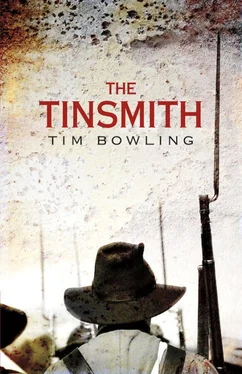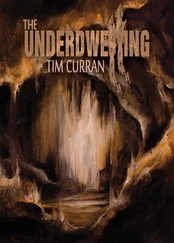“I’m grateful to you, doctor,” he said and extended his hand. “I always have been.”
Anson gripped the hand firmly in return. “I know it, John. I just wish I could be more help to you now. It isn’t right. I wish…” Anson stopped. What did it matter what he wished? His wishes wouldn’t help Dare or anyone. “I’ll do what I can for him,” he said and nodded at the prone figure on the ottoman. “And I’ll do my best to see that your property receives fair value.”
“My Chinese will help. I’ll leave instructions with him.”
“How soon will you leave?”
Dare looked over his shoulder toward the front entrance. When he turned back, his eyes blazed with a strange light. He was almost smiling.
“That depends.”
“On what?”
“On others. There’s no moving in life doesn’t speed up or slow down except for others getting in the way. Or out.”
He didn’t sound bitter or frightened, only resigned. Anson had a sudden impulse to lay a hand gently on his shoulder.
But just then, a flurry of footsteps crossed the ceiling. Raised voices could be heard. Anson’s chest tightened as he glanced upwards and then down again. His mouth was bone-dry.
Dare began to back away.
“John?”
Anson took a step after him, but this felt like he was leaving the sick girl behind. He stepped back.
“My bag’s upstairs,” he said. “I’d better go up.”
Dare stopped. A rush of river smell poured off his sweat-slickened face. He might have been standing in the bow of a skiff, the sun fading along his arms.
There was too much to say, too much to go over. Anson faltered, then pushed ahead. “They’ve been saying slanderous things about you.”
Dare was unmoving, his eyes vivid with will.
Anson had an awful foreboding that this might be their last meeting, that Dare would disappear and never contact him again. He thought a few seconds, then said, “Fighting a war’s no use if it takes your belief away. I can’t afford to doubt you, John.”
The voices upstairs grew louder. Something hit the floor with a loud bang and made Anson start. But Dare remained motionless. His eyes, fixed on the staircase, filled with a strange longing. He touched something at his throat, under the collar, and spoke with a curious, almost questioning tenderness as he stepped back.
“A man can doubt everything. Even a good man.”
This time, as Dare withdrew, Anson did not call his name. In a matter of seconds, he had slipped silently from the house.
Immediately Anson raced up the stairs, the practical demands of living and dying a spur to his purpose. But even so, Dare’s last words echoed on the air. What did they mean? That a man could learn to doubt goodness? Or that even a good man could learn to doubt? Anson had done the latter and he’d come dangerously close to doing the former. But seeing Dare again, even under these tense circumstances, or perhaps because of them, had saved him from that most fatal wound.
He reached the second floor just as the voices in Louisa’s room rose to a crescendo.
July 1881, Chilukthan, British Columbia
At first Anson couldn’t believe what he saw. The room appeared full of people; their shadows stained the walls in grotesque patterns. One lamp spilled a crackling yellow against the mildewed wallpaper of faint roses and over the planks of the floor. His eyes remained fixed there, on the bodies clustered almost in a circle, as if in worship. But what faith could explain the prone young woman with the frozen gaze and Thomas Lansdowne’s wife, on her knees, propped up under the arms like a limp puppet?
“What is this? What’s happened?”
He didn’t even wait for a response from the startled faces. The girl groaned and he hurried to her bedside, stepping over the young woman who had not turned at his rapid approach. As he passed, he recognized the Southerner, Richardson, his white-framed features flushed and wavering in the dimness, his mouth open as if he was about to speak. But Anson’s immediate thought was for the child.
She burned as hot as ever, the spots along her collarbone and chest like circles of flame. A linen cloth, slightly damp, lay like an infected scab on one shoulder; much of her body, including her feet, was exposed. Anson could hardly register the meaning of what he’d come upon; it was like some sort of dark ritual. And yet the girl’s mother and aunt were present. Confused and outraged at once, Anson quickly checked the girl’s pulse. It was rapid. He found a clean cloth on the bedside table and doused it in a basin of lukewarm water. Then he pressed it lightly to the child’s brow.
From behind him came the sounds of motion. Anson pulled the sheet up the child’s body and turned, ready to order the room cleared immediately. But the two Lansdowne women, their pathetic postures like those of statues melted by their own tears, cooled his wrath. He went to them.
Mary Lansdowne cried openly, her round face slick and red.
“Oh, doctor,” she said. “Thank goodness you’ve come! Edney’s had a spell. I don’t know what it is, but… oh, doctor, I shouldn’t have allowed them up, I knew it was wrong!”
“Calm yourself, now. Bring me a chair.” Anson held Thomas Lansdowne’s wife against his chest as she seemed about to collapse. She was rank with sweat, and her heart thudded against him as if he’d wrapped a bat in a towel. Yet as she pulled her head back, Anson saw that her face also wore a strange repose. The contrast was terrible. If not for the heartbeat throbbing along his lower chest, Anson might have thought her dead.
As he guided the woman into the chair, he realized he didn’t have time for either explanations or apologies. Thomas Lansdowne lay bleeding in the parlour. The best time to operate would be while he remained in shock. Anson looked into the woman’s eyes. She did not look back. He touched her stomach, feeling for the child. When it moved, he did not know if it was a good thing or not.
“I had meant to help,” a recognizable voice spoke at his shoulder. “If I had possibly known of the presence of the evil… doctor, I assure you, I wouldn’t have brought Miss d’Espereaux into such a house.”
The Southerner’s face appeared ravaged; he might have aged twenty years. The blue in his eyes was washed out. A muscle in his cheek twitched repeatedly. He clutched a handkerchief like a limp dove in his hand and spoke with a deference that took Anson by surprise.
“If you would be so kind, doctor, to attend to Miss d’Espereaux, I would consider it a great favour. I fear she has been quite overcome.”
Anson looked down. The young woman remained still, but her eyes opened and closed slowly, her chest moved in an easy rhythm under her finery. She had a remarkable beauty. Her white skin shone with it. The rough character kneeling at her side and fanning her face only made her fragile charms more evident.
“Who is she?” Anson said, moving closer. “What’s she doing here?”
“Miss Elizabeth d’Espereaux,” Richardson said brokenly. “One of the world’s most gifted spiritualists.”
So that was it. Anson had heard of spiritualism, of course, knew how popular it was in certain quarters of society. He had even read attacks against it in medical journals: spiritualism, according to these articles, was a haven for quacks and frauds of the most villainous kind. But this young woman was clearly not acting. Something had terrified her. She had, however, begun to emerge from her fright.
“Lizzie? Can you hear me? Are you all right now?”
The rough character’s sincerity softened his crudely hewn face. He turned, perplexed, to Anson.
“She’s never done that before, doc. Never. Has she hurt herself any? I couldn’t catch her before she fell. The colonel there…” He glowered at Richardson. “He got in my way. But it’s the only time he’s going to touch her, I’ll vouch for that.”
Читать дальше












